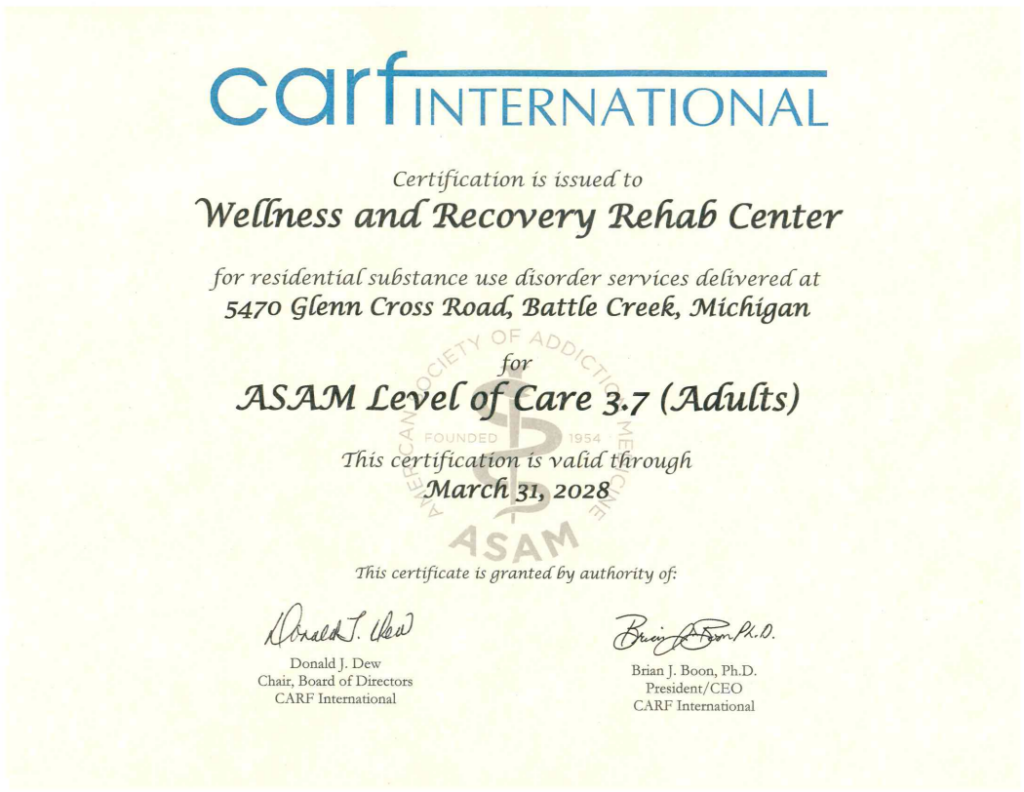
When you or someone you care about is recovering from substance use disorder (SUD), it’s essential to have thoughtful guidance, a clear plan, and compassionate support.

At Wellness and Recovery, located conveniently in Battle Creek, Michigan, we recognize that each person brings their own emotional history, health concerns, and personal goals to recovery. That’s why we carefully tailor our inpatient programs to reflect your circumstances.
Our medical detox services prioritize your safety and comfort, complemented by individualized therapy sessions designed to address your emotional and psychological needs. We also incorporate holistic techniques, empowering you with practical strategies to manage chronic pain and enhance wellness.
By nurturing your emotional, physical, and mental well-being, we support you in creating lasting change and stepping confidently toward a healthier, more balanced life. We work with drug and alcohol addiction treatment centers across the US. From inpatient drug rehabs Port St Lucie to California.
Inpatient programs ease the anxiety of daily stressors by removing the person from everyday routines that might encourage substance use. This secure setting provides room for you to learn new coping techniques, work through cravings, and practice stress management.
We believe that detox is only the start of a greater shift toward a life that is no longer controlled by substances. With close supervision, therapeutic interventions, and a supportive community, you can feel a renewed sense of control and a pathway to ongoing wellness. We work with many alcohol rehabs in San Diego and Florida.
Therapy is the backbone of most inpatient programs. One-on-one sessions help people untangle the events and emotions that fuel their addiction.
At Wellness and Recovery, both formats support personal insight and connection with others. We also include chronic pain management discussions for those who need additional support and strategies.
Addiction does not always stand alone. Many people also struggle with anxiety, depression, or other mental health conditions alongside substance use.
This scenario is known as a dual diagnosis. Many inpatient rehab programs provide dual diagnosis treatment to address all concerns at once and help individuals heal holistically.

An effective rehab center typically offers several evidence-based treatment options. These may include behavioral therapies or medication-assisted treatment (MAT) when necessary.
With a collaborative approach, Wellness and Recovery’s medical and mental health professionals design individualized interventions to meet each person’s unique needs. Our team offers a compassionate and thoughtful approach for everyone who walks through our doors.
The tone and setting of a facility can influence the way treatment unfolds. A peaceful environment can encourage stress reduction, while a welcoming culture can offer emotional safety.
Visit or speak with someone from the program to learn about daily routines, community standards, and overall philosophy. This helps you determine if the facility’s atmosphere aligns with your goals for recovery and chronic pain management.
Recovery is not an isolated event – it is a series of steps that extend long after a person completes inpatient treatment. Holistic services, such as mindfulness practice or light exercise, can enhance self-care and encourage chronic pain management when required.
Completing an inpatient alcohol detox program is a significant triumph, but it’s just the first step in the recovery process. The next challenge is to keep growing in the weeks and months after leaving a structured environment.
A good relapse prevention plan lists possible triggers, from social settings to emotional states, and outlines ways to handle them. This plan might include calling a counselor, attending a group meeting, or engaging in a relaxing hobby.
Addiction affects the mind, body, and spirit. Recovery must address each of these areas. Physical activity, balanced nutrition, and regular sleep support better mental health. Additionally, emotional self-care can include therapy sessions, journaling, or a creative outlet.

Inpatient treatment can be a powerful first step toward lasting freedom from substance use. Within a structured, supportive environment, individuals receive around-the-clock medical care, in-depth therapy, and the space to begin practicing new, healthier ways of living.
Reach out today – healing starts with a single, courageous step.
